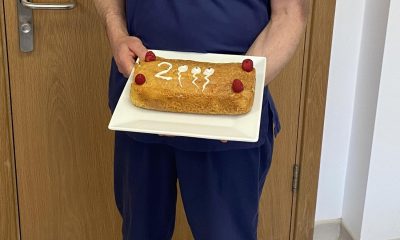Just 30 seconds of sunlight every morning could reduce risk of cancer
NIR light, which is invisible to the human eye, is at its most effective at dawn.
Published
1 year ago onBy
Talker News
By SWNS staff reporter
Getting just 30 seconds of sunlight every morning could slash the chances of developing most types of cancer by as much as 80 percent - early research by one of the UK’s leading specialists suggests.
Less than half a minute’s exposure to the sun’s near-infrared (NIR) light between sunrise and 9 am may offer a higher level of protection to adults and children than eating 2,500 bananas or a kilogram of Brazil nuts per day, according to oncologist Dr. Mohammad Muneeb Khan.
Stepping outside during these times could cut the odds of developing the disease from a one-in-two chance to one-in-ten, making it a more effective inhibitor than any other single preventative measure.

NIR light, which is invisible to the human eye, is at its most effective at dawn, with its beneficial effect gradually waning throughout the day as the human body becomes less responsive to it.
Absorbing it in the early morning prompts the body to release a flood of melatonin, a natural antioxidant twice as powerful as Vitamin E, that neutralizes toxins and prevents cancer-causing gene mutations.
Exposure to NIR light at any other time of day still leads to melatonin production but in insufficient quantities to adequately repair and protect cells.
According to Dr. Khan, a Consultant Clinical Oncologist at Queen's Centre for Oncology and Haematology at Castle Hill Hospital and considered one of the world’s leading experts on cancer prevention in adults, it could be the “ultimate detox."
Recent studies into NIR light are so “highly compelling” that he is now urging people to make an early morning stroll – or to simply stand outside – part of their everyday routine.

Dr. Khan is the founder of the UK-based international charity Killing Cancer Kindly, has 25 years of clinical experience, and has served as the Principal Investigator for a variety of pioneering research trials.
He said: “It really couldn’t be easier. Stepping outside every morning to catch the best NIR light really could be the simplest, cheapest, most effective and by far the most natural way to protect against the Big C for any cancer-free adult anywhere in the world.
“It is still early days but if further research bears out the initial findings about mass melatonin production – which is highly compelling with the potential to reduce the cancer risk rate by five times, from one-in-two to one-in-10, equating to an 80 percent reduction – then we should all make time every morning to bathe in the healing light of the sun.”
Studies have shown that the average human body produces between 800 and 1,000 potentially cancerous cells each day.
Depending on specific lifestyle and environmental risk factors, this figure can be more than double in some individuals.
The body does a good job of removing or preventing these naturally with melatonin, a hormone that among things seeks out and destroys free radicals – unstable atoms and molecules that are created as a by-product of metabolism.

But our in-built detox system can fail or lose its effectiveness, especially with age, leading to an accumulation of damaged cells that can grow into cancer.
Until recently, scientists believed that melatonin, known as the ‘sleep hormone,' was produced solely by the brain’s pineal gland at night.
But in 2016 US researchers discovered that around 95 percent of the body’s melatonin supply is made by mitochondria, miniature organs that are involved in releasing energy from food.
Scientists at The University of Texas Health Science Center in Houston, Texas, found that mitochondria were particularly sensitive to NIR light and that exposing them to it substantially boosted melatonin production.
This, however, is tied to the body’s natural circadian rhythm, with production peaking in the early morning.
Unlike pineal melatonin, the mitochondrial version does not make you sleepy. Instead, its sole function is as a ‘seek and destroy’ anti-oxidant hormone.
Dr. Khan believes this could explain why some races and cultures who rise early and go outside – most notably in Asia, and the Middle and Far East – have significantly lower cancer risk rates than people in the UK and other Western countries.
It is estimated that Americans spend less than eight percent of their time outdoors.
To benefit from NIR, Dr. Khan said the early morning sunlight must hit a specific part of the retina at the back of the eye containing light-sensitive retinal ganglion cells (RGCs). This transmits a signal, through the brain to the mitochondria to produce a flood of melatonin.
Gazing through a car or bus window – or wearing sunglasses – won’t have the same effect as the glass blocks much of the near-infrared spectrum.
NIR absorption on an overcast or rainy day is still possible, but the length of time spent outdoors should be increased from 30 seconds to a maximum of 30 minutes.
Dr. Khan said NIR light is also reflected by plants and trees, so gazing at greenery – or, better, walking in a park – would be ideal.
If you can’t get outside, opening a window and looking around – but never directly at the sun – is said to be the next best thing.
NIR light does not cause sunburn and is not considered a skin cancer risk, he added.
Dr. Khan calls the process his ‘Do Absolutely Nothing’ plan because it is free, takes no time, and requires no effort or planning.
In the US it's estimated that about one-in-two women and one-in-three men will develop cancer during their lifetime – compared with one-in-10 in the Middle East and Asia.
By absorbing NIR light every day, Dr. Khan believes the risk rate could fall to the same levels seen in the Middle East and Asia – a drop of 80 percent.
Smoking, drinking and poor diet cause oxidative stress within the body and are known to increase the risk of developing certain cancers.
Whilst poor lifestyle choices will undo the antioxidant benefits of NIR light, Dr. Khan said it is still better to have daily NIR exposure than none at all.
“When it comes to detox, every little helps especially for individuals who have a high-risk lifestyle,” he said.
“As a general rule activities which generate oxidative stress would undo the benefits of antioxidant detox processes but it is still better to have the benefits of detox such as NIR light even if some of it is offset by lifestyle choices than not having it at all.
“The NIR light benefits are for all age groups. The effects would be more pronounced in adults as they have a reduced detox capability compared to children.
“As we advance in our years the body’s capability to repair damage is naturally reduced and hence it becomes more important for us to adopt a healthy lifestyle.”
Further studies to establish the link between mitochondria and NIR light are set to take place “as soon as possible” through his Killing Cancer Kindly charity.
The charity’s name is inspired by melatonin-like chemicals, which experimental studies suggest could prevent and kill cancer cells ‘kindly’ through a natural process of programmed cell death known as ‘apoptosis.'
He is also planning to release the first ‘anti-cancer guidebook,' detailing how the public can reduce the chances of developing the disease, later this year.
Dr. Khan, who has been working in the global field of cancer prevention for more than two decades said: “The recent discovery in the United States that the human body produces melatonin through sunlight exposure has completely transformed our understanding of this hormone, and its potential health benefits.
“This research provides the basis of a scientific theory as to why some countries, most obviously in parts of Asia, the Middle and Far East, have a significantly lower risk of developing cancer than we do in the UK and other Western countries.
“It could well be because their inhabitants tend to rise very early and get exposed to morning sunlight, as part of their culture – and to escape the hottest part of the day – whereas Britons and other Western nations, as a general rule, do not.
“If this theory can be scientifically proven, then early morning sunlight exposure will come to be recognized as the most powerful – and easily the cheapest and simplest – ultimate detox plan in history.
"While we are waiting for those studies to commence, I believe the evidence thus far points to the benefits of NIR light and that it is in everyone's best interests to catch as little as 30 seconds of the morning sun as early as they possibly can."
Stories and infographics by ‘Talker Research’ are available to download & ready to use. Stories and videos by ‘Talker News’ are managed by SWNS. To license content for editorial or commercial use and to see the full scope of SWNS content, please email [email protected] or submit an inquiry via our contact form.
You may like
Other Stories


Shop owner discovers Victorian jail cells hidden in her basement
She purchased the store having no idea about it history.


Scientists explain why there are ‘spiders’ on Mars
The creepy crawlies are actually small, dark features that form when this happens.


Doctor celebrates 2000th vasectomy with a sperm-themed cake
He says he hopes to raise awareness about the procedure.


Dog theft causes same emotional turmoil as losing a child: study
Some felt the loss was even more intense than the death of a friend or relative.


New innovative submarine looks just like a UFO
It has been specifically designed for the cruise and hospitality sectors.
Top Talkers

 Parenting1 week ago
Parenting1 week agoSingle mom details struggles of feeding her 12 kids

 Lifestyle7 days ago
Lifestyle7 days agoWoman regrets her tattoo nightmare: ‘It’s horrendous’

 Wildlife3 days ago
Wildlife3 days agoClever elephant returns visitor’s shoe that fell into enclosure

 Good News3 days ago
Good News3 days agoDisabled student takes first steps in 10 years on graduation stage

 Health4 days ago
Health4 days agoNew study reveals ‘old age’ begins later than it used to

 Broadcast1 week ago
Broadcast1 week agoHow hard is it for Americans to live sustainably?

 Environment1 week ago
Environment1 week agoHow hard is it for Americans to live sustainably?

 Work2 days ago
Work2 days agoHow much does your workspace affect productivity?
